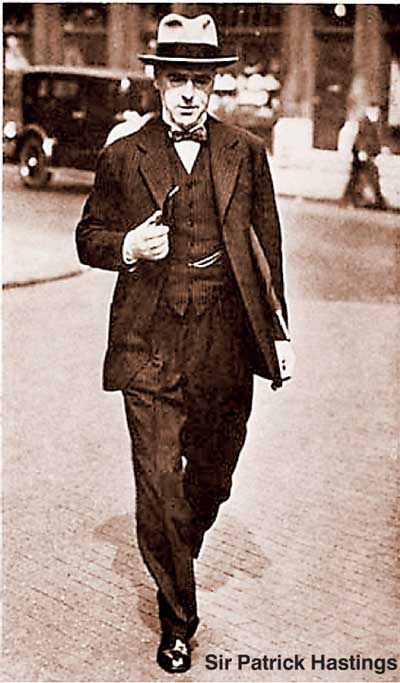Monday Feb 16, 2026
Monday Feb 16, 2026
Saturday, 26 September 2015 00:00 - - {{hitsCtrl.values.hits}}

 Patrick Hastings who was made Attorney General in the Labour led government of Ramsay Macdonald is said to have described his tenure of office as ‘my idea of hell!’ It was not a position eagerly sought by him but only willy-nilly thrust upon the labour MP.
Patrick Hastings who was made Attorney General in the Labour led government of Ramsay Macdonald is said to have described his tenure of office as ‘my idea of hell!’ It was not a position eagerly sought by him but only willy-nilly thrust upon the labour MP.
The hastily created Labour/Liberal coalition government of 1923 had only a handful of Kings Counsel in their ranks, out of whom Hastings being the least objectionable. Although with the office came a knighthood and the recognition as the head of the bar, Hastings later commented: “If I had known what the next year was to bring forth I should most certainly have declined.”
Once appointed, Hastings soon buckled down to his task. His day was said to be one long rush between the House of Commons, government departments and the law courts , many days working from 7 a.m. to 5 a.m. the next day! It is said that the Policemen on duty at the House of Commons complained to their superiors that the Attorney General was working too long hours, since they too had to stay on duty with him!
The Campbell case
The Ramsay Macdonald government was short-lived. One of the major causes for its downfall was the famous Campbell case. On 30 June 1924 Archibald Bodkin the Director of Public Prosecutions (DPP) brought to Hastings notice an article in the Communist leaning ‘Workers Weekly’ wherein the Editor urged the members of the military to refuse to shoot at their fellow workers in a time of war.
Based on this article, Hastings urged the prosecution of J.R. Campbell, the Editor of the newspaper, for violating the ‘Incitement to Mutiny Act’. On 6 August Campbell’s house was raided by the Police and the Editor arrested.
But this was England. On the very day of the arrest, John Scurr, a backbencher in Hastings’s own Labour party, asked the Home Secretary on whose orders Campbell was arrested and for what reason. Another Labour backbencher Jimmy Maxton rose to question the Prime Minister (and his own party leader) Ramsay Macdonald whether he had read the article in question, and if he is aware that it merely contains a call to the troops not to allow themselves to be used in industrial disputes, a point of view shared by a large number of members sitting on these benches? This line of questioning led to an uproar in parliament, compelling the Speaker to suspend the sittings temporarily.
The next day Attorney General Hastings had a meeting with both the Solicitor General and Member of Parliament Jimmy Maxton who was acquainted with the detained Editor JR Campbell. Maxton brought to their attention that Campbell was only a temporary Editor of the paper and had not written that article. In fact it was an article reproduced from another journal.
Hastings then called on Ramsay Macdonald to brief him on the situation of the case. The Prime Minister thought that the Director of Public Prosecutions was to be blamed for the fiasco but that they should go ahead with the case for sake of credibility. The Attorney General Hastings however refused to pass the blame to the DPP, accepted all responsibility, but recommended that the charges against Campbell be withdrawn. The Prime Minister promptly concurred.
But the storm did not blow away with the withdrawal of the case. While the public as well as the media believed that there was undue government interference in the case, the Conservatives and the Liberals began to accuse the government of attempting to pervert the course of justice. Prime Minister Macdonald declared to the Parliament: “I was not consulted regarding either the institution or the subsequent withdrawal of the case.”
But even a hint of interference in the judicial process affronts the idea of justice. Soon the Macdonald government was facing an embarrassing Motion of Censure in the Parliament. Although the Conservatives found it difficult to muster the necessary numbers to carry the motion, the Liberals also supported the idea of appointing a Select Committee to investigate the whole matter. Before too long the government of Ramsay Macdonald fell.
Sir Patrick Hastings took the entire responsibility for the Campbell case but defended his actions with great spirit, earning even an appearance on the cover page of TIME magazine with the title ‘What have I done wrong?’ – a quote from his speech in defence of his conduct.
Impressive and versatile background
Hastings had an impressive and versatile background. He did not come from a rich or privileged family and grew up in strained conditions. At one stage, the family even moved to the Continent in search of a better life. While in Europe young Hastings was innocently arrested for a short period on suspicion of involvement in the murder of a parson. Later on, he enrolled in the British Army and saw action in Africa during the Boer War.
Hastings’ path to becoming a Barrister was extremely difficult with many a disappointment on the way. But through patience, hard work and determination he achieved success, then became an MP and eventually the Attorney General. He also made a name as a writer of plays of some merit.
Whether in the case of J.R. Campbell there was an attempt at perverting the course of justice is arguable and controversial. Hastings believed that he exercised his judgment professionally, independently and impartially. In countries where there is a credible rule of law every person has a right to expect independent, impartial and professional conduct from the Attorney General. His function is described as quasi-judicial, nearly judicial.
Although the Department of the Attorney General is administratively a government department, in his core functions the Attorney General is not subject to the control or directions of any other authority. Put simply, no other authority can direct him to either charge or discharge a person. He acts solely based on his considered judgment, exercised impartially and independently.
Essential element of the rule of law
But herein we confront a huge conundrum. There is hardly a person who will not agree that an independent and impartial Attorney General is an essential element of the rule of law. But it is an idea very easy in concept, but vastly complex and elusive in substance. Real independence of character, impartiality of judgment, liberality of attitude needs supporting cultures and value systems. In reality these are qualities easily professed but rarely witnessed.
It is obvious that neither the idea of an independent judiciary nor the concept of an office of a quasi-judicial Attorney General originated in our history or culture. They were introductions of the colonial experience, coming as new and alien concepts, perhaps even at odds with the prevailing environment. This unfamiliarity with the essence and the imperfections in the understanding lead to awkward situations, judicial officers often equating independence of mind with being unfriendly or reclusive, while ignoring the true nature of bias, which is ingrained.
In England it is said that the office of the Attorney General goes as far back as the 13th Century, if not further, when a professional attorney was asked to appear in a court on behalf of the King. From those distant, ill-defined beginnings the office evolved; his role, the functions, the traditions, down to the qualities ordinarily required of the holder of the office, developed and became part and parcel of the legal system of that country.
Not all holders of the office, in the centuries in-between, represented these values, but the systems were strong and were able to overcome and move forward. In the quality of its legal literature, the clarity of their judgments, lofty standards demanded of the legal profession and the overall integrity of the system Britain remains a reference point to other countries. To this day, the British legal system can take pride in the high esteem it is held in universally.
What do we want of our Attorney General?
What do we want of our Attorney General? To act based on the rumble in the marketplace? To only prosecute the rivals of those in power, blindly and mechanically? It actually happened ,the Sarath Fonseka case was a damnable instance where a political opponent was crushed by the full might of the law while murderers and rapists went about freely, mocking the very idea of justice.
The whole system was subverted and made to go after the political opponents of the government, while turning a blind eye to anything done by the ruling party or family. Could it be said that the police, the Attorney General and even courts acted impartially and independently in that era?
One cannot ask an institution to act independently and then complain when it acts in a manner contrary to your partisan expectations. On the contrary, a person or institution which acts independently and impartially deserves the respect of all stakeholders. That does not mean that the opinion of the Attorney General ought to be accepted even if it is perverse.
If the opinion of the Attorney General is completely outside the realm of rationality it is always open to refer the matter to an independent lawyer for another opinion. It is also possible for the parliament to exercise its supervisory powers to examine the integrity of the decision making process in that Department by way of a Select Committee. Perhaps even a Commission of Inquiry, if adequately empowered, can look into the actions of the Attorney General.
But that is only in a case where it is clear that the Attorney General is acting outside of his power, irrationally or perversely.
If otherwise, we have to realise that an independent and impartial Attorney General is a bulwark of our freedoms. Where the powers that be cannot have their way, perhaps it is already happening.